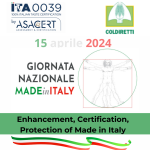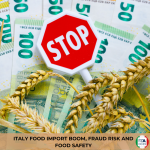Italian agri-food exports (in continuous growth) despite numerous structural difficulties, remains one of the most active sectors of the national economy. However, the numbers of Italian Sounding and counterfeiting, that have touched 100 billion in the last decade, are still worrying.
The President of Federalimentare Ivano Vacondio recently said that the agri-food export sector has grown by 81% in the last 10 years; however, in order to reach the desired share of 50 billion in food exports, new bilateral agreements with the main trading partners of the Peninsula are needed, and above all there is a need for political and pro-position statements in favor of more authentic production and against the phenomenon of Italian Sounding and Counterfeits.
To date it is estimated that the fake Made in Italy and international piracy have generated around 100 billion euros, with a 70% growth in 10 years, to the detriment of the official Italian export segment which, due to fake Italian, continues to suffer not only considerable economic damage, but also heavy damage to the image, due to the marketing of products that are completely inadequate with respect to production standards.
According to some of the most important associations in the food & beverage sector, including Federalimentare and Filiera Italia (an association founded under the aegis of Coldiretti), immediate measures are needed to support the economic growth of agri-food exports that allow easier management of trade between the various countries involved. One of the most pressing requests concerns the facilitation of access to international markets which should be simplified in such a way as to allow even the smallest companies to answer exhaustively to the export demand. Despite the numerous difficulties with which the export sector finds itself struggling, it is clear that a project shared by the competent authorities that aims to promote Made in Italy could represent the most suitable response to the internal stagnation of the sector.
Also due to the recent revaluation of the Mediterranean diet – ranked in first place in the 2019 Best Diet ranking by U.S. News & World Report – attention to the Italian agri-food world has grown further. “Abroad, our food and wine heritage is an institution,” said Luigi Scordamaglia, President of the Study Center of Filiera Italia, focusing on the importance and prestige that the Italian culinary tradition holds internationally and on how this recognition of “know-how” can represent a real driving force for the Italian food and wine brand.






